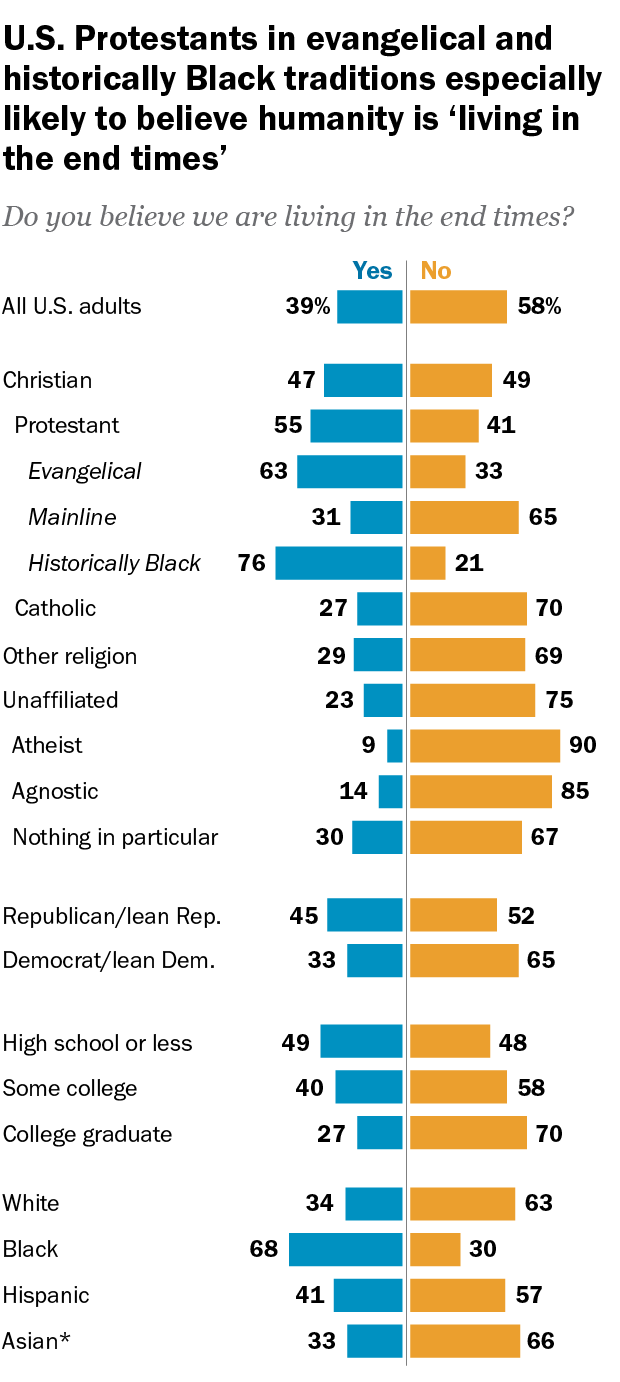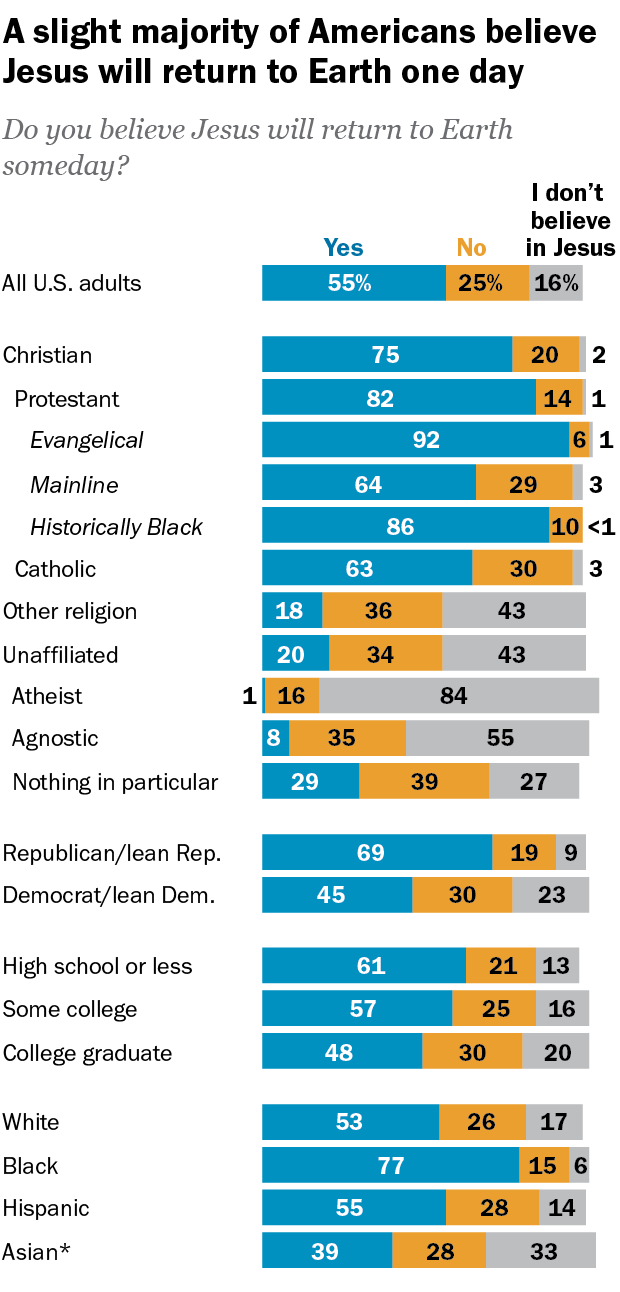Evangelical Christianity is built on the ever-present possibility of the Second Coming of Jesus Christ. This belief permeates sermons and songs alike and has spawned a cottage industry of books and movies.
Talk of the “end times” often is used to explain the troubles of the world, the threats of liberalism, the reason for war and as a motivation for religious conversion. While some Christians teach of an imminent “rapture” from the earth, many others believe in a Second Coming without a rapture — a word not found anywhere in the biblical text.
For two millennia, many Christians have believed they were living in the “end times.”
 But it turns out that belief isn’t as prevalent today as might be expected. A new national survey by Pew Research Center found only 39% of American adults believe “we are living in the end times,” while 58% say they do not believe these are the end times.
But it turns out that belief isn’t as prevalent today as might be expected. A new national survey by Pew Research Center found only 39% of American adults believe “we are living in the end times,” while 58% say they do not believe these are the end times.
The question was asked as part of a larger Pew study on attitudes about climate change. Researchers wondered whether Americans see climate change as part of the run-up to the end times or even view the end times as a reason not to worry about climate change.
That study found highly religious Americans (those who say they pray each day, regularly attend religious services and consider religion very important in their lives) are far less likely than other adults to express concern about warming temperatures around the globe. However, the reason for less concern appears to be more political than theological, Pew reported.
“Highly religious Americans are more inclined than others to identify with or lean toward the Republican Party, and Republicans tend to be much less likely than Democrats to believe that human activity (such as burning fossil fuels) is warming the earth or to consider climate change a serious problem,” the report states.
Also, religious people are more likely to dismiss concerns about global warming by declaring God is in control of the environment.
Wars, natural disasters and other catastrophes often lead to predictions that the end is near. And it turns out that overall, Christians are more likely than Americans as a whole to believe we are now living in the end times.
Pew found 47% of U.S. Christians believing these are the end times, compared to 29% of those from non-Christian religions and 23% of those with no religious affiliation.
Among U.S. Christians, belief that these are the end times is strongest among historically Black Protestants (76%) and evangelical Protestants (63%).
Christian belief that these are not the end times is strongest among Catholics (70%) and mainline Protestants (65%).
However, on the whole, Protestants are twice as likely as Catholics to say we are living in the end times.
Pew found Black Americans (68%) are much more likely than Hispanic (41%), white (34%) and Asian (33%) Americans to believe these are the end times. And adults in Southern states (48%) are more likely to say this than those living in the Midwest (37%), Northeast (34%) or West (31%).
The Pew survey also delved into theological beliefs about the end times, asking whether respondents believe Jesus will, in fact, return to earth one day. This theology of a Second Coming is a key tenet of orthodox Christian belief, shared across evangelical, mainline and Catholic teaching.
Affirmation of a Second Coming is spoken in both the Apostles Creed and the Nicene Creed, although more explicitly in the Nicene Creed.
Pew found more than half of all U.S. adults (55%), including three-quarters of Christians, believe Jesus “will return to earth someday.”
Four in 10 Americans do not anticipate a Second Coming at all.
On the other hand, 25% of Americans told Pew they do not believe Jesus will return to earth and 16% say they don’t believe in Jesus at all — meaning four in 10 Americans do not anticipate a Second Coming at all.
As for timing, only one in 10 Americans believe Jesus will return during their lifetime, while 27% aren’t sure about this.
 Despite some variations among subsets of American religious identity, “in all religious groups, people are more likely to express uncertainty over the timing of Jesus’ return than to express the sense that it will happen in their lifetime,” the Pew report says. “For example, about seven in 10 evangelicals say either that they are not sure Jesus will return during their lifetime (50%) or that Jesus will definitely or probably not return during their lifetime (21%). And nearly two-thirds of those in the historically Black Protestant tradition say they are either unsure of the timing (47%) or that it will probably or definitely not happen during their lifetime (17%).”
Despite some variations among subsets of American religious identity, “in all religious groups, people are more likely to express uncertainty over the timing of Jesus’ return than to express the sense that it will happen in their lifetime,” the Pew report says. “For example, about seven in 10 evangelicals say either that they are not sure Jesus will return during their lifetime (50%) or that Jesus will definitely or probably not return during their lifetime (21%). And nearly two-thirds of those in the historically Black Protestant tradition say they are either unsure of the timing (47%) or that it will probably or definitely not happen during their lifetime (17%).”
Pew researchers also ventured into the complicated world of end-times theology known as premillennialism and postmillennialism. Both words take their names from the biblical teaching of a millennial reign of Christ related to the Second Coming. Premillennialists believe the world’s condition will keep getting worse until the Second Coming. Postmillennialists believe the world will keep getting better until progress ushers in the Second Coming and the kingdom of God on earth.
A specific form of premillennialism known as premillennial dispensationalism is behind the popular “Left Behind” books and movies. Belief in a rapture is most closely identified with premillennial dispensationalism.
A majority of Americans don’t identify with either premillennialism or postmillennialism, Pew found. After removing the 41% who don’t believe there will be a Second Coming, the remainder of Americans are divided among a third who say Jesus will return but “it is impossible to know what will happen before Jesus returns,” 20% who identify with the premillennial notion that things will get worse and only 3% who believe in the postmillennial view that things will get better.
Notably, even evangelical Christians are divided on this question, Pew found, with 44% taking a premillennial stance and 45% saying that it is impossible to know the circumstances that will precede Jesus’ return.
Related articles:
Let’s be clear: Putin’s invasion of Ukraine is not about the rapture and Russia in biblical prophecy | Analysis by Rodney Kennedy
Don’t forget the religious implications of geopolitical upheaval | Analysis by Richard Wilson
What’s wrong with ‘Left Behind’? | Analysis by Mark Wingfield


